Evaluating Nutrition Information and Misinformation
1/113
There's no tags or description
Looks like no tags are added yet.
Name | Mastery | Learn | Test | Matching | Spaced |
|---|
No study sessions yet.
114 Terms
Anecdotes
Reports of personal experiences.
Evidence based
Information that is based on results of high-quality scientific studies.
Treatment group
Group being studied that receives a treatment.
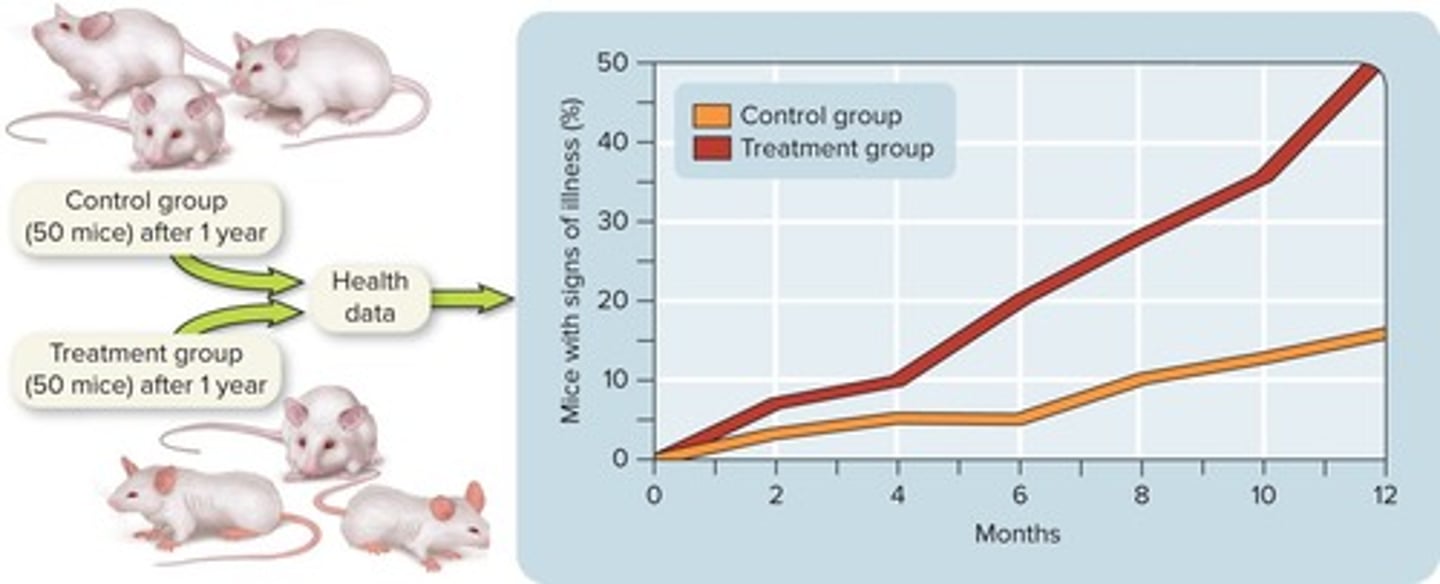
Control group
Group being studied that does not receive a treatment.
Variable
Personal characteristic or other factor that changes and can influence an outcome.
In vivo experiments
Experiments conducted on whole living organisms, such as mice.
In vitro experiments
Experiments or 'test-tube' experiments conducted on cells or other components derived from living organisms.
Randomized controlled trial (RCT)
An experiment where members of a large group of human subjects are randomly assigned to either the treatment or the control group.
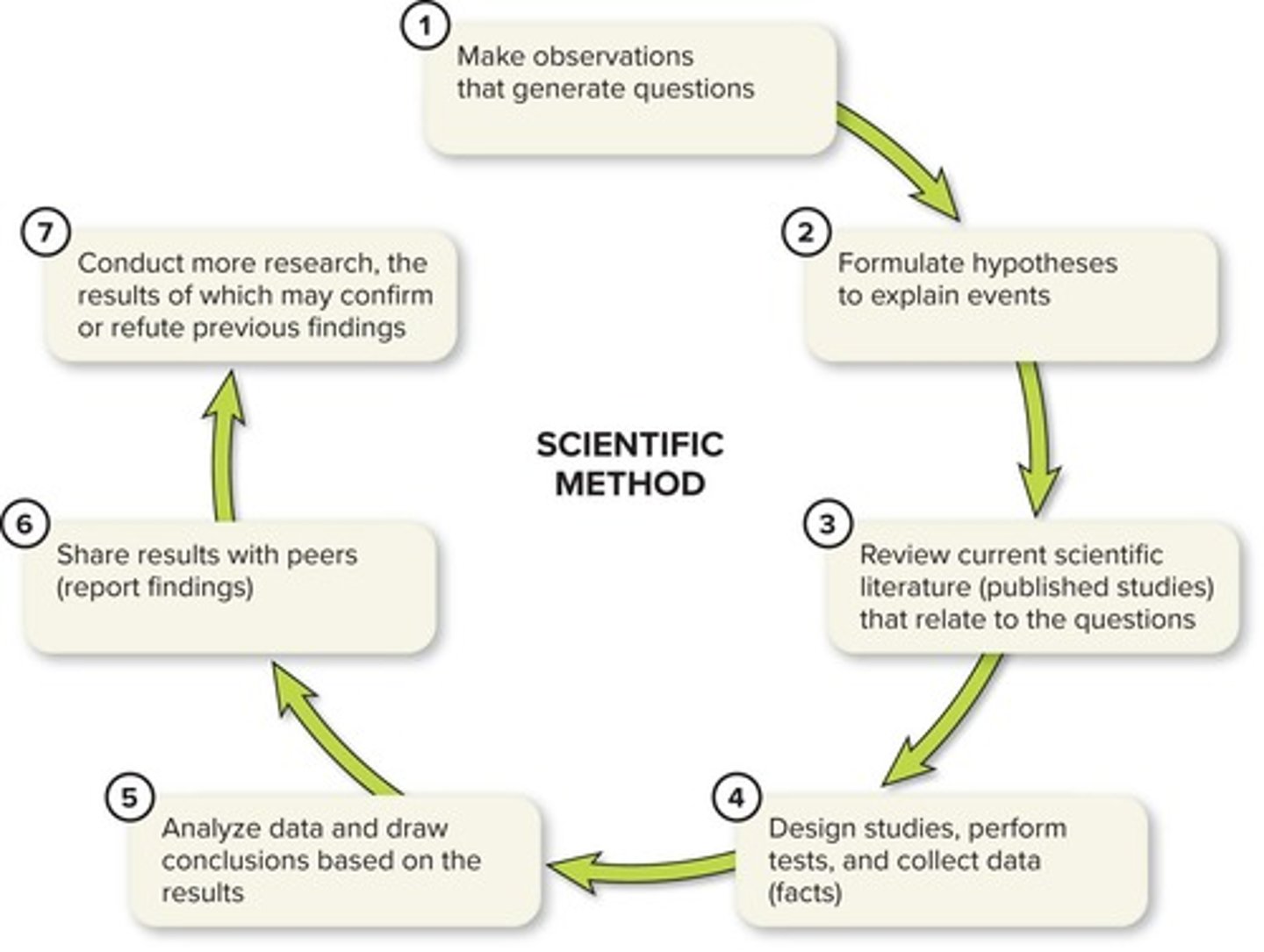
Placebo
Fake treatment, such as a sham pill, injection, or medical procedure.
Placebo effect
Positive response to a placebo.
Observational epidemiological studies
Studies that can determine risk factors that may influence health.
Dietary supplements
Include vitamin pills, as well as products that contain echinacea, ginseng, and garlic.
Registered dietitian nutritionists
Reliable sources of food and nutrition information.
Scientific method
Basic steps used to conduct scientific research.
Direct (positive) relationship
A relationship between two variables where they move in the same direction.
Inverse (negative) relationship
A relationship between two variables where one variable increases as the other decreases.
Laboratory experiments
Systematic ways of testing a hypothesis.
Health outcomes
Results related to specific dietary practices.
Common sense
Judgments based on practical experience rather than scientific evidence.
Conventional wisdom
Tradition-based beliefs about dietary practices.
Intuition
Understanding or knowing something without conscious reasoning.
Peer-reviewed articles
Articles that have been evaluated by experts in the field before publication.
Risk factors
Factors that may influence health outcomes.
Experimental studies
Studies that involve manipulation of variables to determine effects.
Human research
Research involving human subjects to study health outcomes.
Nutrition information
Data and facts related to dietary practices and health.
Scientific research
Systematic investigation to establish facts or principles.
Nutrition experts
Professionals who rely on scientific research to inform dietary practices.
Double-blind study
Experimental design in which neither the participants nor the researchers are aware of each participant's group assignment.
Single-blind study
Researchers know which subjects are in the treatment and control groups.
Epidemiology
The study of the occurrence, distribution, and causes of health problems in populations.
Case-control study
Individuals with a health condition (cases) are matched to persons with similar characteristics who do not have the condition (controls).
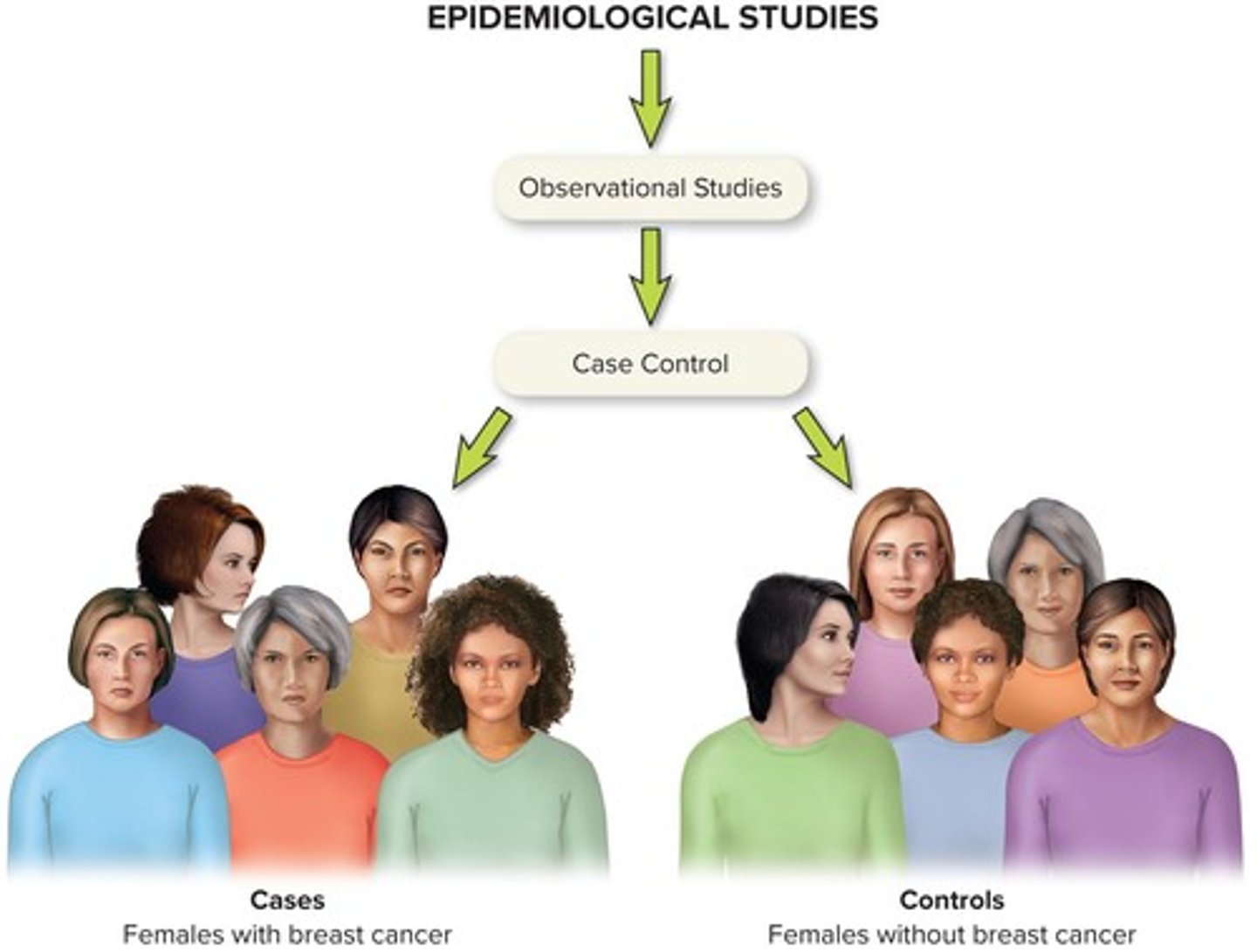
Cohort study
Collect information and analyze variables from a large group of people over time; can be retrospective and prospective.

Retrospective
Means 'to look back.' Researchers collect information about a group's past exposures and identify current health outcomes.
Prospective
Means 'to look forward.' Follows a group of healthy people into the future and looks for factors that may have contributed to changes in their health.
Correlation
A relationship between variables. Occurs when two variables change over the same period.
Direct (positive) correlation
Results when two variables change in the same direction.
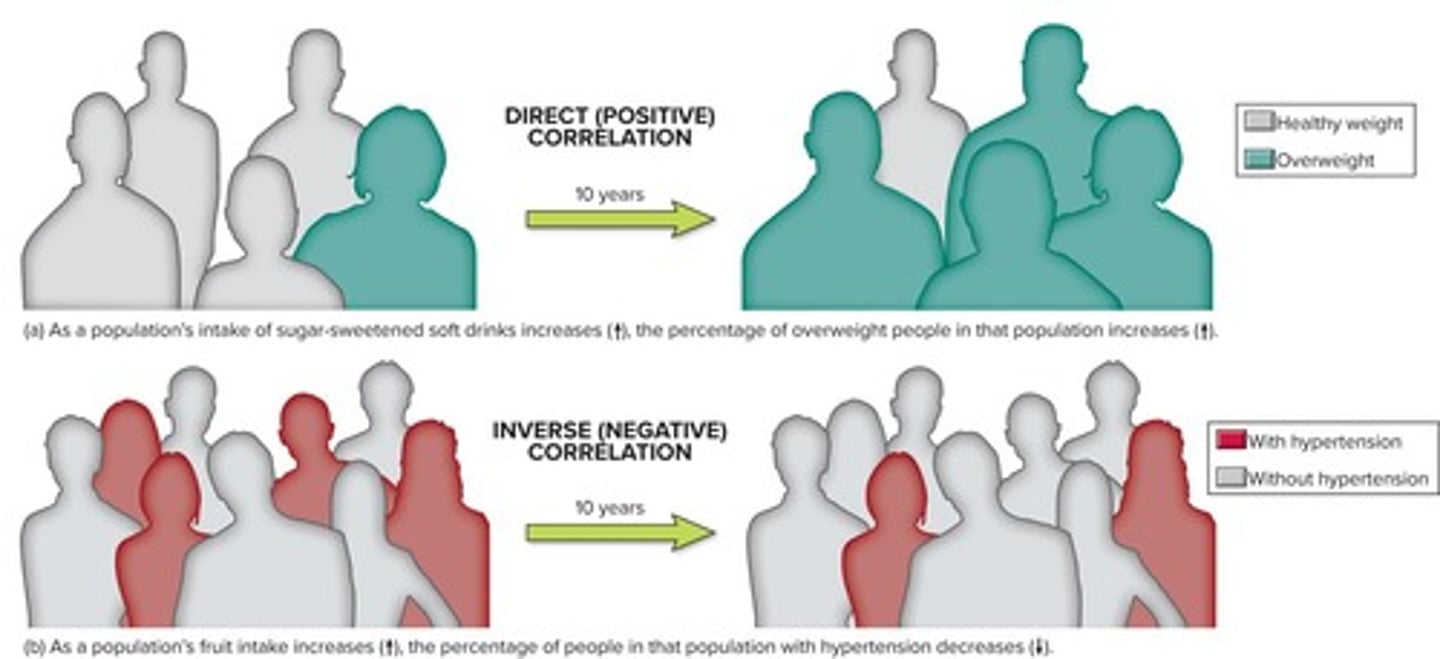
Inverse (negative) correlation
Occurs when two variables change in opposite directions.
Research Bias
Scientists are expected to collect and analyze data in an honest and objective manner, avoiding the influences of personal attitudes or biases.
Peer review
A critical analysis of the study and its findings conducted by a group of 'peers' (experts involved in related research).
Nutrition misinformation
Information that is incorrect or biased, often found in popular sources such as magazines and the internet.
Conflicting study results
Often the result of different study methods.
Critical Consumer of Nutrition Information
Do not assume that information in popular media is reliable.
National Health and Nutrition Examination Survey (NHANES)
A program designed to assess the health and nutritional status of adults and children in the United States.
Statistical methods
Methods used by researchers to analyze data and find relationships between variables and health outcomes.
Publication process
Articles submitted for publication in scientific journals undergo peer review before being published.
Funding sources disclosure
Peer-reviewed scientific journals require authors to disclose funding sources to reveal potential 'conflicts of interest.'
Old beliefs and practices
Discarded when they are not supported by more recent scientific evidence.
Common red flags of misinformation
Signs that indicate nutrition information may be unreliable.
Access the text alternative for slide images
Instruction indicating that additional information is available in a different format.
Health outcomes
The results or effects of health-related interventions or exposures.
Variables
Factors that can change and affect the outcome of a study.
Epidemiological studies
Studies that cannot establish causation but can determine correlations.
Scientific articles
Research findings that are summarized and submitted for publication in scientific journals.
Nutrition information sources
Different platforms where nutrition information can be found, including peer-reviewed journals and popular media.
Scientific evidence
Data and findings that support or refute a hypothesis or belief in the field of nutrition.
Nutrition Misinformation
Information that is misleading or false regarding nutrition.
Quackery
Promoting useless medical treatments without proper training.
Red Flags 1
Promises of quick and easy remedies, claims that sound too good to be true, scare tactics, and personal attacks on registered dietitian nutritionists.
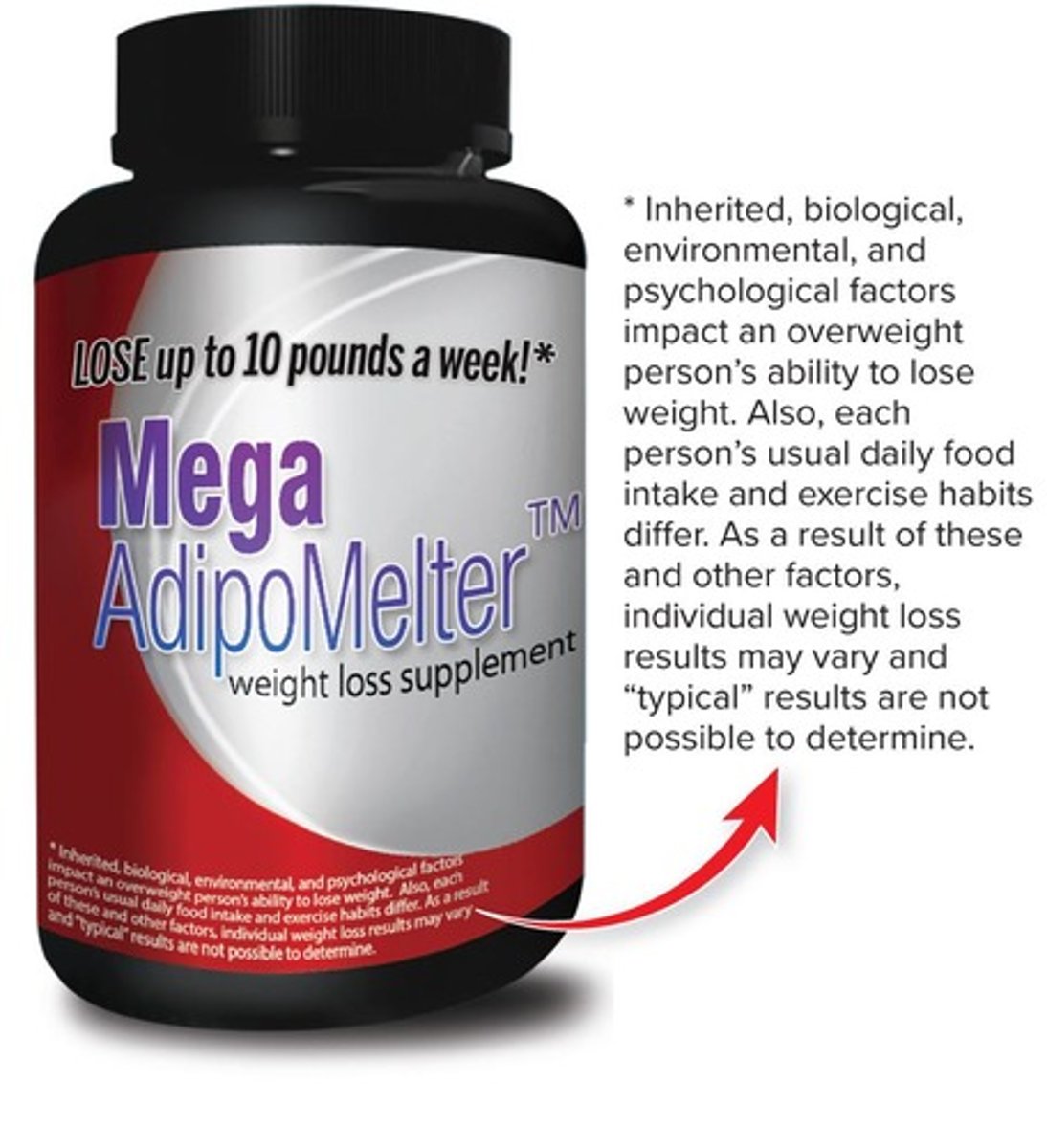
Red Flags 2
Reliance on testimonials and anecdotes, overlooking risks of products, vague terms, and sensational statements with incomplete references.
Red Flags 3
Recommendations based on a single study and unsupported information concerning nutrients or human physiology.
Results Disclaimer
A statement indicating that the manufacturer is not responsible for verifying claims made about a product.
Reliable Nutrition Experts
Nutrition professors, registered dietitians (RD), and registered dietitian nutritionists (RDN) are considered reliable sources.

Registered Dietitian Nutritionist (RDN)
A legally protected credential for nutrition professionals who meet specific educational and practice requirements.
Becoming an RDN
Complete an ACEND accredited master's degree, a supervised practice program, and pass the national registration examination.
Nutrition Information Sources
Use multiple sites like .gov or .org and rely on those managed by qualified health professionals.
Health On the Net Foundation
An organization that promotes reliable health information online.
Nutritionist Definition
There is no standard definition for 'nutritionist' or 'nutritionalist.'
Internet Information Caution
Consider who sponsors the site and if the information is intended to promote sales.
Vague Terms
Terms that sound scientific but lack specific meaning or context.
Commercial Sites Warning
Be wary of commercial sites (*.com) that may not provide reliable information.
Dietary Supplements
Products intended to supplement the diet, which may include vitamins, minerals, herbs, or other botanicals.
Peer-Reviewed Nutrition Journal
A scientific journal that publishes articles reviewed by experts in the field before publication.
Scare Tactics
Using fear to influence consumer behavior regarding health products.
Personal Endorsement
A testimonial given by an individual promoting a product based on personal experience.
Scientific Evidence
Information that is supported by reliable and verifiable scientific research.
ACEND
Accreditation Council for Education in Nutrition and Dietetics, which accredits educational programs in dietetics.
Supervised Practice Program
A practical training component required for becoming a registered dietitian.
National Registration Examination
An exam that must be passed to become a registered dietitian nutritionist.
Nutrition Information Research
The process of questioning and researching the accuracy of nutrition information.
Testimonials
Statements from consumers about their experiences with a product, often used in marketing.
Anecdotes
Personal stories or accounts that may not be scientifically validated.
Claims of Superiority
Statements asserting that certain dietary supplements or practices are better than conventional methods.
Incomplete References
Citations that do not provide full details, making it difficult to verify the information.
Dietary Supplement
According to the Dietary Supplement Health and Education Act of 1994 (DSHEA), a dietary supplement adds to a person's dietary intake and contains one or more dietary ingredients, including nutrients or botanicals (herbs or other plant materials), is taken by mouth, and is a concentrate, metabolite, constituent, or extract.
Examples of Dietary Supplements
Dietary supplements include nutrient pills (for example multivitamin/mineral products), protein powders, and herbal extracts.
Conventional Medicine
Health care practices that are widely accepted and used by mainstream medical practitioners, such as surgical procedures, FDA-approved medications, and dietary patterns that promote good health.
Alternative Health Care
Health care practices that are not widely accepted and used by conventional medical practitioners, such as the use of dietary supplements, yoga, chiropractic manipulations, and meditation.
Integrative Medicine
When conventional and alternative health care practices are combined.
Regulation of Dietary Supplements
Dietary supplements are regulated as a category of foods nontraditional, not as drugs, and can bypass many strict FDA regulations imposed on medications.
FDA Standards for Supplements
The FDA sets quality standards but does not test supplements to ensure standards are met.
Quality Testing for Supplements
Supplement manufacturers can choose to have quality testing done by certain nongovernmental agencies to receive a 'seal of approval.' This is not a guarantee that supplements are safe or effective.
Safety of Micronutrient Supplements
When used properly, micronutrient supplements are generally safe.
Risks of Herbal Supplements
Herbal supplements may contain toxins, with highly toxic or cancer-causing plants including comfrey, pennyroyal, sassafras, kava, lobelia, and ma huang.
Consulting a Physician
Determine whether the supplement is necessary and discuss your need for the supplement with your physician or RDN.
Children and Supplements
Consult a physician before giving products to children.
Serious Illness Symptoms
Consult a physician as soon as you develop signs and symptoms of a serious illness.
Investigating Supplement Claims
Be wary of claims made about a supplement's benefits and investigate by searching for reliable information.
Hazards of Supplements
Determine hazards associated with taking the supplement (risks vs. benefits).
Nutritious Foods vs. Supplements
Avoid using dietary supplements as substitutes for nutritious foods.